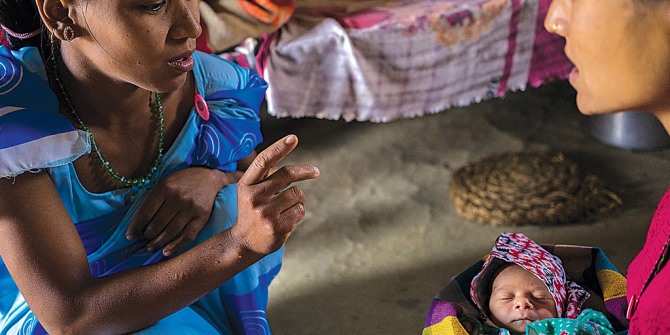In the last few years Pakistan has witnessed an increase in terrorist activity. But what does such an increase mean for the health of children? Daniel Grossman (West Virginia University, USA), Umair Khalil (Monash University, Australia), and Arijit Ray (West Virginia University, USA) explain what their research reveals about the way terrorist attacks further deteriorate quality of children’s health in Pakistan.
Terrorism and violent attacks on civilian populations have increased precipitously across the globe in recent decades. These events cause fatalities, destroy infrastructure, and create an environment of fear. This dramatic rise in violence can also lead to indirect impacts on a less explored dimension: child health.
Early childhood, including the in-utero period, is an important developmental period. Violence and other stressors can have negative effects on the health of both mothers and their children. Thus, violent incidents suffered in-utero and in early childhood can have critical impacts on childhood and later life health and human capital outcomes, the so-called fetal origins hypothesis first argued by David Barker in 1990.
One country that has suffered immensely in recent years with respect to increased terrorist activity is Pakistan. According to the Global Terrorism Database during the period 2006 to 2011, around 13% of attacks worldwide occurred in Pakistan. These attacks were particularly intense as well, with 45% having more than 10 fatalities. On the other hand, Pakistan already fares poorly in basic health indicators: it ranks 8th highest in the world in proportion of children under 5 being stunted; it has the 6th lowest health expenditure to GDP ratio; and it has only 0.6 hospital beds per 1000 people. This is likely to amplify any potential impacts of terrorism on social indicators.
In our research, recently published in the journal Social Science and Medicine, we study whether this increase in terrorist activity has further contributed to the poor state of child health in Pakistan. Focusing on children under 5 years, we exploit spatial and temporal variation in the occurrence of terrorist incidents across tehsils (sub-districts) in the Pakistani province of Punjab. We focus on an intensity of terrorist attack measure, defined as the number of fatalities per attack, both in-utero and post-birth, and study its effect on a variety of health outcomes.
Our analysis concludes that a 1 standard deviation increase in the intensity of attack in utero, which amounts to 2.4 fatalities per attack in our data, leads to approximately 4 to 5 more children per 1000 being classified as stunted and as severely stunted in regions experiencing terrorism. This effect is substantially larger for post-birth attacks and leads to 13 more children per 1000 with stunted height. We find similar negative impacts on weight outcomes of young children.
Importantly, our results are not likely to be driven by spurious channels. One major concern in such studies is teasing out causality from a mere association. For instance, in our settings if terrorists are able to target only those areas where the population is already impoverished and has worse outcomes, then the above analysis will incorrectly conclude a `causal’ impact of terrorist activity on health. We document no systematic relationship between the occurrence of an attack in an area and pre-determined characteristics of individuals, like basic demographics and socio-economic measures, living in those areas.
For our analysis, we use rich survey data from the Multiple Indicator Cluster Survey conducted by the United Nations International Children’s Emergency Fund in collaboration with the Government of Punjab and UN Development Program. These data also include measures of vaccination receipt. Policy makers and researchers are interested in determining mechanisms through which the above documented effects might operate as they can inform future policy options. In our analysis we find evidence that following terrorist attacks, infants are less likely to receive the tuberculosis (TB) vaccine and the Pentavalent vaccine, which immunizes children against five deadly childhood diseases including meningitis and pneumonia. For the TB vaccine, which the WHO recommends to be administered as soon as possible after birth, we find that a 1 standard deviation increase in attack intensity three months before birth leads to over 5 fewer children per 1000 being administered the TB vaccine. Pakistan has one of the highest TB prevalence rates in the world. The results are of a similar magnitude for the Pentavalent vaccine.
These results suggest that in places in which terrorist attacks occur healthcare receipt becomes more difficult. The pathways through which this may occur are complex. First, deteriorating security situations may make it more costly for mothers to travel to local health facilities both in terms of monetary and non-monetary costs. Terrorist attacks also tend to lead to greater investment in defense against attacks while decreasing economic development. Taken together, this likely crowds out potential investments in healthcare as well as private investment.
If we consider vaccination take up as a proxy for general health care receipt, especially for preventive care, our findings suggest that following an attack, incidence of preventable diseases may increase. From a psychological perspective, women may be more afraid to travel to a physician and the stress of the attack may have a direct negative effect on the health of the child. From an infrastructure perspective, attacks may damage medical facilities and/or transportation infrastructure, decreasing the supply of either medical care or transportation to a doctor. Given the adverse effects of early childhood shocks on adult outcomes, adequate health and human capital interventions should be a major policy goal in regions suffering from sustained terrorist and violent attacks. Violent events experienced in utero or in early childhood can have long lasting impacts on health and human capital development.
This article gives the views of the author, and not the position of the South Asia @ LSE blog, nor of the London School of Economics. Featured image: Child with kite; credit: Cocoparisienne, Pixabay.





